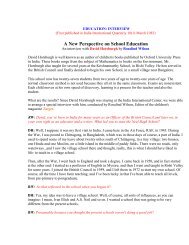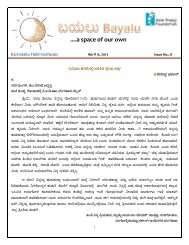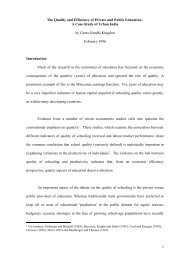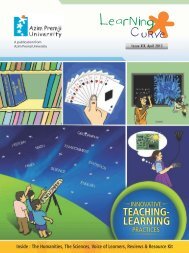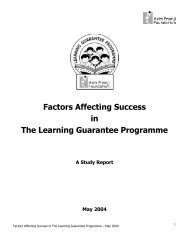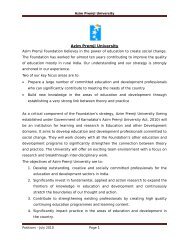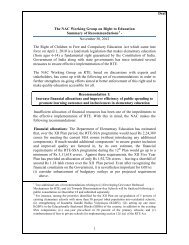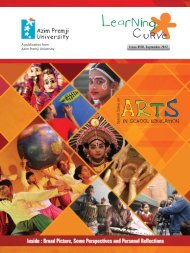Indesign Pagesnew.indd - Azim Premji Foundation
Indesign Pagesnew.indd - Azim Premji Foundation
Indesign Pagesnew.indd - Azim Premji Foundation
You also want an ePaper? Increase the reach of your titles
YUMPU automatically turns print PDFs into web optimized ePapers that Google loves.
04<br />
Section A<br />
Education for Democracy – The Relevance of<br />
Social Science Education in Schools<br />
Anjali Noronha<br />
We have a subject called social science taught in<br />
some form or the other in schools across the world.<br />
Sometimes it goes by the name of Environment<br />
Studies (like in the present primary schools in India),<br />
sometimes as separate subjects – history, geography, civics<br />
(or the more Contemporary Citizenship Education in many<br />
countries today or social and political Life as in India) until<br />
middle school and then as history, geography, economics,<br />
political science and sociology in high school. In some<br />
countries and at some times there has been a subject called<br />
social studies and some kinds of thinking excludes history<br />
and geography from the social sciences and treats them as<br />
separate subjects while including economics, political science<br />
and sociology in the social sciences. For the purpose of this<br />
article I will not enter into that discourse, however relevant.<br />
By social science I mean all subjects dealing with the analysis<br />
of some or all aspects of society and social life seen through<br />
some lens or the other. Thus history is part of social science<br />
as it analyses continuity and change in different aspects of<br />
society and their interrelationships over time, geography as<br />
it does the same across regions, economics as it develops<br />
and applies the concepts and method to analyze economic<br />
aspects, sociology as it does the same for the social aspects<br />
and political science for political aspects. Till the elementary<br />
level of schooling, the latter three are not taught as separate<br />
subjects but are in some way integrated through the subject<br />
of civics, citizenship education or social and political life as<br />
the case may be.<br />
It is only through conscious effort of a<br />
certain kind (education being one of them)<br />
that the attitudes, values and competence<br />
required for converting democracy from<br />
principle to practice can be developed and<br />
inculcated.<br />
Irrespective of how we understand the social sciences, there<br />
is often a question in the minds of parents and society in<br />
general as to whether the social sciences are relevant at all<br />
to the lives of people in today’s technocratic world. The fi rst<br />
question people ask is what<br />
will a child do if s/he takes<br />
up the study of any of the<br />
social sciences at the plus<br />
two or the college level?<br />
What kind of ‘job prospects’<br />
does s/he have? Become<br />
a teacher in a school or<br />
college, a researcher or academic; join one of the services<br />
through the entrance exams? Take up a management fi eld<br />
particularly Human Resource Management. All these options<br />
are open to a graduate of engineering or a medical student<br />
as well so why take up social sciences if the option of the so<br />
called technical fi elds is open?<br />
This attitude percolates to the lower school level as well<br />
where students (and parents) have the attitude of children<br />
wanting to just pass in the social sciences. Seldom is it asked<br />
as to how the social sciences can contribute to make a student<br />
a better person or make them capable of contributing to the<br />
betterment of society or in fact, how can the teaching and<br />
learning of social sciences at school sustain and develop<br />
a democracy. Specializing in a social science at the college<br />
level needs to be looked at differently from the essential<br />
education in the social sciences at the school level.<br />
Having said this, I will focus in this paper on the relevance of<br />
the content and method of social science education in school<br />
in today’s life with particular reference to civics/citizenship<br />
education/ social and political life. My main focus will be<br />
on the relevance of social science education for building,<br />
sustaining and developing a democracy. In doing so, I will<br />
outline the challenges faced by social science education<br />
from the present power structure of society and its ethics<br />
of hierarchical, feudal and exclusive modes of behavior<br />
legitimized by the teachers and parents themselves.<br />
Social Science Education as Education for<br />
Democracy<br />
Democratic societies are fairly ‘evolved’ societies in the sense<br />
that they demand of the individual, in practice, a certain<br />
set of attitudes, morality, abilities and competence that<br />
require a high degree of sublimation of innate tendencies in<br />
human beings that are contradictory to the above; so that<br />
the principle of democracy actually becomes a practice of<br />
democracy. It is only through conscious effort of a certain<br />
Pg No: 23



